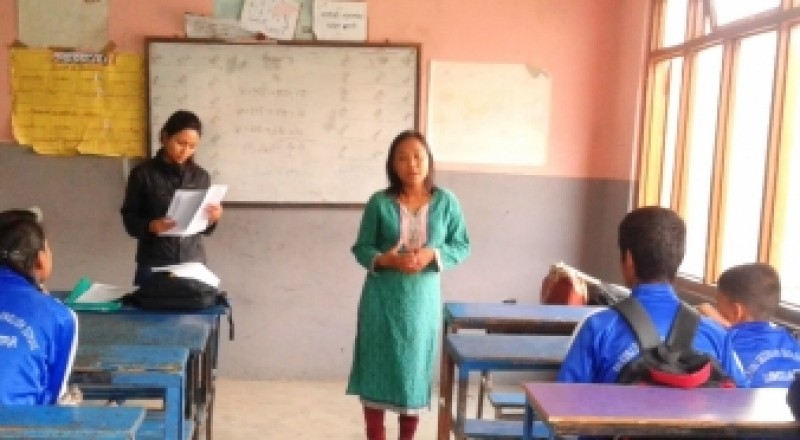Menstrual taboos negatively affect adolescent girls. Globally, evidence suggests that girls receive insufficient guidance and information about menstrual onset, hygiene and management, and often, taboos reinforce gender inequalities and prevent their active participation in society.
HERD is conducting ‘Analysis of Menstrual Hygiene Practices in Nepal: The Role of WASH in School Programme for Girls Education’ with the support of UNICEF. The study is being conducted in 8 schools of Achham, Bajura and Parsa district. The overall objective of the project is to understand the effect of WinS (WASH in Schools) on school attendance and to explore how menstrual management affects girls’ confidence and social interactions at school as well as in the community.
Pre-testing is regarded as an important phase in any research. It is carried out to assess if the tools developed are relevant, consistent and in a flow. It helps to know the level of understanding of the respondent, the length of time required for an interview and subsequent changes required in the tools. The obstacles which might come during the data collection can be sensed during pre-testing.

This is a mixed methods study applying quantitative and qualitative research methods. To obtain quantitative information, non-participant observation, self-administered questionnaire and structured interviews. Likewise, Focus Group Discussions (FGDs), group interviews and semi-structured interviews will be conducted under the qualitative component. The pre-test was conducted only for the quantitative components.
Pre-testing for the quantitative tools was carried out on March 31 at Balkunj Secondary Boarding School in Mahalaxmi municipality of Lalitpur. Total 12 students participated from grade 8 and 9 of which 4 were female and 8 were male. Before the questionnaire, a half an hour orientation was conducted. Interview was taken with the girls while the boys were asked self-administered questions.
Putting tools into Practice: Project Officers share their experience

Macchindra Basnet, Project Coordinator: “To achieve the objective of the project, we have come up with research questions to explore the menstrual restrictions and their effects, how comfortable girls feel to manage menstruation at school and at communities, effect of menstruation on school attendance and perceptions on WinS intervention.” We finalized the tools after extensive literature review and consultation with experts. We are also conducting a similar study ‘Menstrual Hygiene Management Study’ for Wateraid, which has helped to get a deeper insight of the subject matter."

Sangeeta Khimbanjar, Project Officer: “During the pre-test I realized that the questions were suitable for the study site. It is always easy to take an interview with an adult but not with the children as they have numerous queries. I felt really good as they used to cross question and showed interest in the issue. During the pre-testing, we noticed that as the class is gender inclusive the students didn’t feel comfortable asking questions to teachers, those issues were also not discussed at the home. These things showed that the students had queries but didn’t feel comfortable discussing except for peers. We also found out that some of the girls didn’t use sanitary pads as their economic condition was not good and for some the shop was too far.”

Puja KC, Project Support Officer: “This is the first time I have been involved in any project since the beginning. I was involved in the selection of tools but the actual learning took place at the field. I knew about the tools but during the pre-testing I learnt how to apply them in real case scenario. I also understood where questions need to be rephrased. Overall, the pre-test was a great learning experience, particularly for a beginner like me.”



Comments(0)
No comments found.